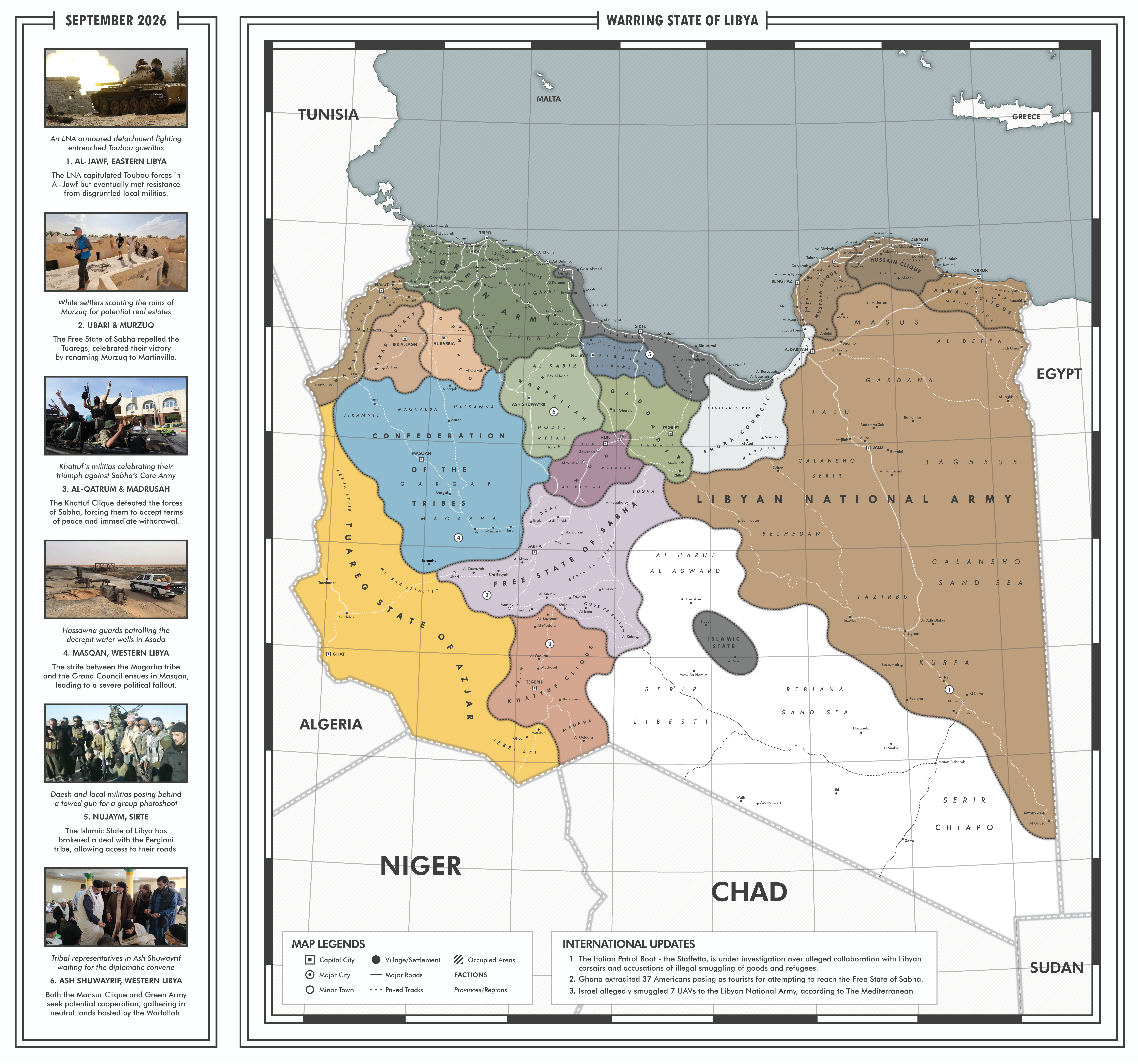HOME | DD
 ShahAbbas1571 — Warring Libya - Islamic State of Libya
ShahAbbas1571 — Warring Libya - Islamic State of Libya

#future #libya #maps #middleeast #timeline #worldbuilding #futurehistory #gaddafi #sirte #mapsandflags #daesh #maps_and_flags #islamicstates #warringstateoflibya #shahabbas1571
Published: 2020-07-11 11:58:04 +0000 UTC; Views: 10075; Favourites: 93; Downloads: 28
Redirect to original
Description
Description
“Don’t be fooled by their change of heart! They’re still the marauding jihadists hiding behind a reformed mask!”
- Dimitry Vasily, Main contributor to the Northern Front expressing his doubts on the Islamic State of Libya.
The Islamic State of Libya, commonly-known as Daesh, are remnants of the original Islamic State who splintered from their home region. Establishing a small but resilient foothold over the surrounding city of Sirte, they expanded across the entire regions surrounding the Gulf of Sirte, and redefine the original mission of their organization; replacing the overarching strive for a Pan-Islamic caliphate for a more "moderate" religious internationalism and localism. Securing the shore surrounding their respective region, they managed to form a considerable monopoly over the situation concerning the Neo-Barbary Crisis, allowing local corsairs to use their lands as a platform for their operations and became a haven for fishermen carousing over the Mediterranean Sea.
Their forces are divided between the hardened veterans and the local militias. The former serves as the main vanguard of their entire army: They are battle-hardened foreign volunteers who fought during the earliest years of the Islamic State, a quarter of them are composed of disgruntled Chechens, of which they serve as their elite shock unit. The local militias serve as garrisons protecting their territories and supporting guards to accompany their campaigns. Most of them are recruited from the local towns and sometimes young men from local tribes, some independent units such as the Misrata Brigade pledge their loyalty in exchange for territorial autonomy. The Islamic States are the only few forces to wield a navy. Unlike the highly-equipped warlords of Eastern Libya however, their flotilla consists mostly of improvised speedboats meant to protect their fishing fleets from harm and also used by the corsairs as transport vehicles; speeding across the seas as they kidnap their victims.
Economically, they inherited a meager and underdeveloped backwater wedged between two populous and industrial regions. Despite these challenges, the Islamic State has managed to accumulate a consistent flow of income through three major supplements: An efficient taxation system, a consistent flow of tribute from autonomous states, and a rejuvenated fishing industry. They managed to develop a cohesive form of taxation under a fair sum and even allowing the local netizens to pay according to their wage and living, which leads them to garner enough funds to develop their lands without alienating the people through cumbersome demands. With the city of Misrata and the Shura Council pledging their allegiance under their wing, they managed to collect a form of tribute from them through the consistent flow of either material assets or literal cash. Lastly, they turned the loose fishing sprawls spread across the Gulf of Sirte and beyond into a lucrative market which supplies them a surplus amount of food for their subjects and their soldiers: Aided by their beneficiaries from Sabha, they capitalized the flourishing fishing zone flowing with tuna to great effect. Despite being an economic hub for corsairs operating across the Mediterranean Sea, their actual contribution to their treasury is nothing more but negligible due to expenses demanded by the Free State of Sabha for their aid. Despite lacking any industrial power, they managed to control the city of Misrata: An economically-prosperous city housing many powerful industries, including the third-largest steel factory throughout the African continent.
Just like the Free State of Sabha, they are foreign interlopers only tolerated by the locals due to their competent bureaucracy and unusual leniency over the matters of possible dissidents, more so compared to the likes of the Green Army. The new Caliph and his local accomplices have managed to develop a court system far less brutal than those exercised by their western rival and less corrupt compared to the phony jurisdiction favored by the local cliques over Eastern Libya: Many constituents within their territory consider their jurists to be fairer and more considerate than those from both ends, especially after dealing a detrimental property dispute that they managed to apprehend coherently in 2022; and most of their sentences are milder and corporal when it comes to criminal punishment, sentencing offenders ranging from disclosed caning to lengthy confinement in prisons. They still exercise the jurisprudence of the Sharia code under the ideological context of the Salafi Movement, punishing those who commit solicited vices under their rule. However, they give some exemptions in the name of pragmatism: they allow tribal politicking to exist to keep them in check and include secular laws to address the local challenges present throughout the gulf. What separates them from their brothers mucking around the Levant, however, is their ideological invention: They completely abandoned the original call for an Islamic superstate and replace it with a more nationalistic take where each state, or Dawlat, locally addresses their religious duties under their own volition.
Considered by rivaling powers as a foreign interloper interfering with the local affairs surrounding the Warring State, the Islamic States is wedged between a zealous proto-state cursing for their downfall and the remnants of the LNA pledging to destroy their presence in Libya. The Green Army, despite the cordial exchanges between the Qayid and the Caliph, still present themselves as the biggest threat to the Islamic States: They launched frequent raids against their fishing boats and waged a campaign to take over the valiant city of Misrata, only to be brokered by a rather fragile peace deal that many considered to be dubious in practice. The LNA also presents itself as an imposing threat towards their survival: Their men are mustered to launch an offensive against the feeble but strategically-important city of Zelten, threatening to attack their core territories from their underbelly and seeking to establish a forward base to form a platform for future campaigns. However, they managed to bring key powers such as Misrata and the Shura Council under their influence and garnered enough support from Sabha to lend their equipment and expertise to provide aid for their corsairs.
Related content
Comments: 4

👍: 2 ⏩: 1

👍: 0 ⏩: 0

Nice work. And wow, you put some serious thought into the backstory!
👍: 1 ⏩: 1

👍: 0 ⏩: 0






















